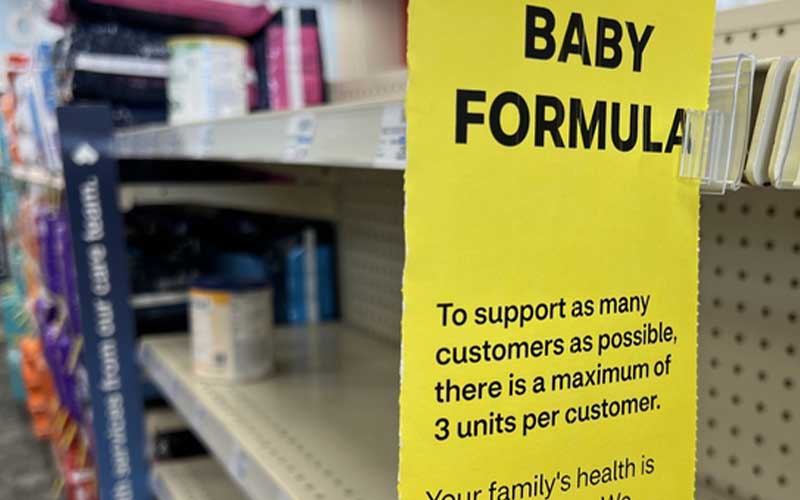TRENTON, NJ – As the baby formula crisis in America continues, New Jersey Attorney General Matt Platkin today announced Governor Phil Murphy’s sweeping new baby formula state of emergency. Under that state of emergency, state officials and law enforcement will be monitoring the sale of overpriced baby formula, price gouging and black market baby formula sales.
“New Jersey’s price gouging law went into effect when Governor Murphy signed Executive Order No. 296 on May 17, 2022 to address the formula supply shortage in the state,” Platkin said. “The State of Emergency restricts excessive price increases, and prohibits certain unconscionable commercial practices during the declared State of Emergency and for 30 days after its termination. An excessive price increase is any price that exceeds 10 percent of the price the product or service was sold during the normal course of business prior to the State of Emergency.”
“We firmly believe that New Jersey is the best place in the nation to raise a family, and during this challenging time, we want to support our families with all of the resources at our disposal,” said Governor Murphy. “I am signing today’s executive order to enable our State to take any necessary steps to address this critical issue. To any retailer who may try to take advantage of vulnerable families during this shortage, let me be clear that this reprehensible action will not be tolerated. And to any New Jerseyan affected by this shortage, rest assured that my administration will do everything in our power to ensure families have access to the formula they need.”
“The current baby formula shortage may have scammers and unscrupulous vendors coming out of the woodwork to take advantage of parents at a vulnerable time,” said Acting Attorney General Platkin. “We are putting merchants on notice that we stand ready to take action and hold accountable those who exploit any crisis for financial gain.”
In addition to the baby formula state of emergency, the New Jersey Law Against Discrimination (LAD) offers protections for families who may need to rely more on breastfeeding during the formula shortage. LAD requires employers to grant reasonable accommodation for pregnancy, childbirth, related medical conditions, and breastfeeding to enable individuals to continue working while maintaining a healthy pregnancy or return to work after giving birth. Employers may not in any way penalize or retaliate against employees for requesting or using accommodation for pregnancy or breastfeeding.
According to the new executive order, price-gouging violations are punishable by civil penalties of up to $10,000 for the first offense and $20,000 for the second and subsequent offenses. Violators may also be required to pay consumer restitution, attorney’s fees, and investigative fees, and may be subject to injunctive relief. Each individual sale of merchandise is considered a separate and distinct violation.
To date, the Division has received approximately 16 consumer complaints – approximately half of those have been received after the State of Emergency was declared – alleging price gouging related to the offer or sale of baby formula. In addition to reviewing those complaints, the Division is aware of reports of online scams and monitoring instances of them affecting New Jersey consumers, and the potential for baby formula not authorized to be sold in the state or expired formula making its way into the marketplace.
NJ Office of the Attorney General Press Release
“As we continue to review reports of alleged price gouging and other questionable tactics, we ask consumers to help us by reporting any excessive prices and scams they observe while shopping for baby formula,” said Cari Fais, Acting Director of the Division of Consumer Affairs. “The Division is prepared to take action against violators, but when it comes to consumer protection, New Jerseyans can also play an active role in putting a stop to price gouging and fraud.”
The attorney general’s office issued the following guidance today in a press release:
For example, consumers should beware of in-store or online advertisements for overpriced baby formula or offers that demand a wire transfer payment and may not deliver any product. The Division also recommends consumers take the following precautions:
- Use known and reputable merchants: Type out the company’s address directly rather than clicking on a link that was sent to you. Make sure websites are not fraudulent by checking that they use the correct spelling of a business name, have operational customer service numbers, and have a real street address rather than a post office box.
- Do research before buying. Learn more about the merchant or product by typing the name and the words “scam,” “complaint” or “reviews” into a search engine, and be suspect of any company with only positive reviews, as they could have been paid for or manipulated.
- Check expiration and packaging. Parents are urged to play close attention to expiration dates and packaging to ensure that the formula is not expired and has not been tampered with.
- Beware of certain foreign distributors. Many baby formulas available outside the U.S. are safe, but some may not meet federal nutrient requirements. In response to the shortage, the FDA has modified its guidance to increase supplies. Visit the FDA’s website for questions and answers for consumers concerning infant formula.
- Check with pediatrician first. Parents considering a new brand of baby formula or making home-made baby formula are urged to check with their infant’s health care provider first.
Those who believe price gouging is occurring are encouraged to file complaints online – where photos, receipts, and other evidence of price gouging can be uploaded – or call 1-800-242-5846 to receive a complaint form by mail.
Consumers are also encouraged to report any potential scams they encounter by visiting the Division’s website. For guidance from the Department of Health and other information about the state’s efforts to address the national baby formula shortage, visit nj.gov/babyformula.

